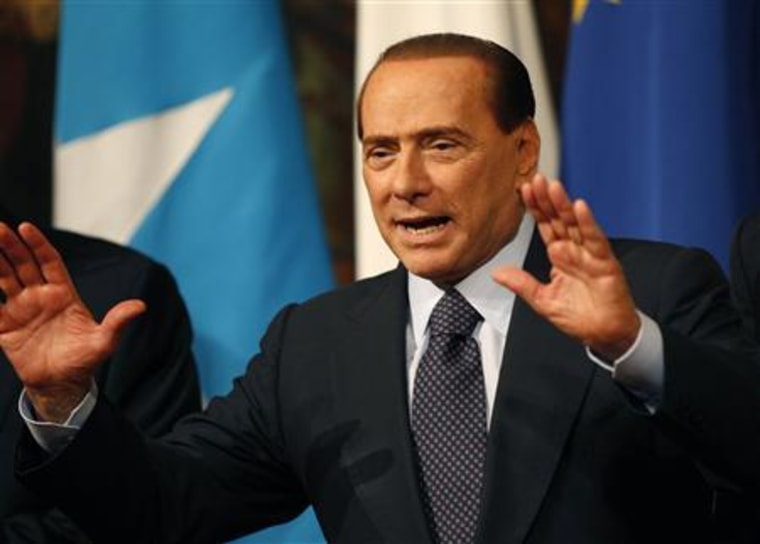More than 2,000 Italian women — mothers and daughters, politicians, artists and others— have signed an online petition telling Premier Silvio Berlusconi that not all women in Italy are prostitutes or showgirls, in response to his encounters with a teenage Moroccan girl.
The campaign, entitled "Basta!" or "Enough!" is being coordinated by the leftist L'Unita newspaper, which is close to Italy's center-left opposition. It was announced Thursday as criticism mounted against the premier and the Vatican expressed concern over the scandal.
Prosecutors have placed Berlusconi and three associates under investigation, alleging he paid for sex with the 17-year-old girl and used his office to cover it up. Prosecutors have said Berlusconi had sex with several prostitutes during parties at his Milan estate.
The 74-year-old premier has gone on a campaign to refute the accusations, taping two video messages and an audio monologue in recent days in which he denounced the prosecutors as politically driven.
The teen, nicknamed Ruby, has begun a media blitz of her own to deny they ever had sex. On Wednesday she appeared on one of Berlusconi's television stations to refute reports, contained in wiretapped conversations published in Italian newspapers, that she asked Berlusconi for €5 million to keep quiet.
"I could do something exaggerated, but I could never arrive at a statement like that," she said. She admitted though that he gave her €7,000 to help her out financially but said he "never put a finger on me."
Italy's opposition leaders have demanded again that Berlusconi resign and there is talk among his allies of calling early elections. But Berlusconi has insisted he's not going anywhere and would gladly testify in court — as long as the judges were impartial.
On Thursday under a headline "The Women's Revolt," L'Unita published what it said was a partial list of 2,000 Italian women who had signed its campaign to tell Berlusconi they'd had enough of his antics.
"There are other women," the paper wrote in an editorial, listing the names of prominent union leaders, opposition politicians, actresses, journalists and citing ordinary Italian mothers and daughters. "There are women who don't consider it a victory to go into a powerful man's home and come out having earned what a normal (person) earns with seven months of work."
The campaign is similar to the "I'm not at your disposal" campaign launched last year by left-leaning La Repubblica newspaper as another sex scandal swirled around Berlusconi. It was sparked after Berlusconi insulted the looks of a middle-age, matronly opposition politician, Rosy Bindi, who shot back: "I'm not one of the women at your disposal."
Her retort struck a nerve in Italy, where nearly naked television showgirls are a celebrity class of their own and a staple of Berlusconi's TV empire. It sparked a backlash that garnered 100,000 signatories in less than a month.
On Thursday, the Vatican No. 2, Secretary of State Cardinal Tarcisio Bertone, called for a "more robust morality, a sense of justice and legality" in all citizens and "especially those who have public responsibility of any kind." In the first comments from a Vatican official, Bertone said the Holy See was following "these Italian events with attentiveness and concern."
Avvenire, the newspaper of the Italian bishops' conference, said this week that the scandal was "hurtful and upsetting" and had damaged Italy's international reputation.
